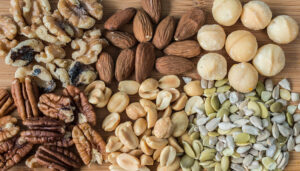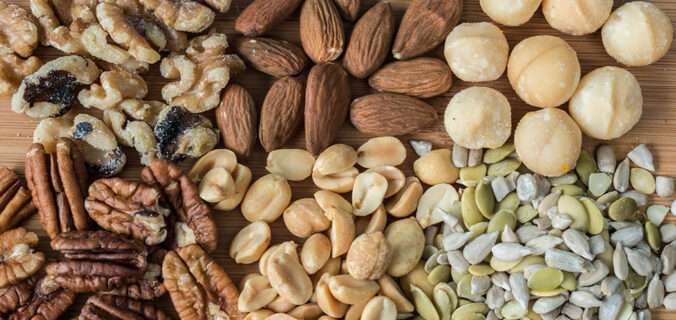
- Nuts and seeds are good sources of protein, healthy fats, fibers, vitamins and minerals.
- Nuts and seeds regulate body weight as their fats are not fully absorbed, they regulate food intake, and help burn energy.
- Nuts and seeds contain unsaturated fats and other nutrients that provide protective effects against heart disease.
- The Australian Dietary Guidelines recommend a daily nut intake of 30 grams as part of a healthy, varied diet in adults.
A nut is a simple dry fruit consisting of one or two edible kernels inside a hard shell. Examples include almonds, Brazil nuts, cashew nuts, hazelnuts, macadamias, pecans, pine nuts, pistachios and walnuts. Although peanuts are legumes, they are considered nuts due to their similar characteristics to other tree nuts.
The nutrient profiles of seeds are very similar to those of nuts. Commonly consumed seeds include pumpkin seeds, flax seeds, sesame seeds, poppy seeds, sunflower seeds, psyllium seeds and chia seeds.
Research has shown that regular nut consumption as part of a healthy diet does not promote weight gain, and can protect against chronic diseases such as heart disease and diabetes. Less is known about the benefits of seeds due to limited research, but they are thought to provide similar health benefits due to similarities in nutrient content.
Nutrients in nuts and seeds
Overall, nuts have very similar macronutrient (protein, carbohydrate and fat) profiles, but different types of nuts may have slightly different micronutrient (vitamin and mineral) content.
Nuts have about 29 kJ of energy per gram, and are:
- high in monounsaturated fats (most nut types) and polyunsaturated fats (mainly walnuts)
- low in saturated fats
- good sources of dietary protein, hence a good alternative to animal proteins. Some nuts are also high in amino acid arginine, which keeps blood vessels healthy
- free of dietary cholesterol
- high in dietary fibre
- rich in phytochemicals that act as antioxidants
- rich in vitamins E, B6, niacin and folate; and they provide minerals such as magnesium, zinc, plant iron, calcium, copper, selenium, phosphorus and potassium.
Like nuts, most seeds are rich in protein, healthy fats, fibre, minerals such as magnesium, potassium, calcium, plant iron and zinc, and contain vitamins B1,B2, B3 and vitamin E. Oily seeds also contain antioxidants that stop the fats from going rancid too quickly.
Due to the unique nutrient profiles of nuts and seeds, they are known to provide several health benefits, including:
- helping with weight regulation
- reducing risk for heart disease
- reducing risk for diabetes.
Nuts and body weight
Although nuts and seeds are high in energy and fats, eating nuts is not associated with weight gain. In fact, based on large population studies, higher nut intake has been found to be associated with lower body weight.
When included as part of a weight-loss diet, nuts have been shown to further promote weight loss and fat loss in the abdominal region. Lower fat in the abdominal region means lower risk for chronic diseases such as heart disease and diabetes. Therefore, nuts can be part of a healthy diet. The Australian Dietary Guidelines recommend a daily consumption of 30 grams of nuts per day.
Nuts assist with weight regulation in several ways:
- fat absorption – fats in nuts are not fully digested and absorbed by the body. Research shows that only 68 to 94 per cent of fats from nuts are absorbed
- hunger and fullness – nut consumption promotes fullness and suppresses hunger or the desire to eat. As a result, food intake is reduced. This effect is due to the protein, fat and fibre content of nuts
- energy expenditure – some research suggests that eating nuts can increase the amount of energy we burn. Another study shows that the energy we burn following a nut-enriched meal comes from fat sources, meaning that we burn more fat and store less fat in the body.
Lower fat absorption, reduced food intake, and greater energy expenditure collectively contribute to the weight regulating effects of nuts. The effect of seeds on body weight has not been researched extensively but is likely to be similar to that of nuts as they are also high in protein, healthy fat and fibre.
Recommended daily serving of nuts
The Australian Dietary Guidelines recommends one serving of nuts per day for adults. One serving is equivalent to approximately 30 grams or one third of a cup (or one handful). Since all nuts are very similar in term of nutrient content, a wide variety of nuts can be included as part of a healthy diet. This equal to about:
- 30 almonds
- 10 Brazil nuts
- 15 cashews
- 20 hazelnuts
- 15 macadamias
- 15 pecans
- 2 tablespoons pine nuts
- 30 pistachios
- 10 whole walnuts or 20 walnut halves
- a small handful of peanuts or mixed nuts.
Including nuts and seeds in your diet
A variety of nuts and seeds can be included in a healthy diet. As different types of nuts have slight differences in their vitamin and mineral content, eating a variety of nuts will increase your levels of various nutrients.
Instead of eating a biscuit or piece of cake as a snack, try having a handful of raw or dry roasted nuts. Combining nuts and seeds with low-energy dense foods (such as vegetables) is a good way to enhance vegetable-based meals – for example, in Asian-style dishes or added to a salad.
Regular consumption of nuts, seeds and legumes is recommended for vegetarians, vegans or people who avoid animal foods. They are a good substitute for meats, fish and eggs as they contain protein, fat, iron, zinc and niacin. More than 30 grams of nuts and seeds a day may be needed to ensure adequate protein.
To help boost iron absorption from nuts and seeds, eat them with vitamin C rich foods and beverages such as tomato, capsicum, orange and citrus juices.
There is no need to soak or remove the skin of nuts (or ‘activate’ them) unless you prefer the flavour and texture of soaked nuts. Research has disproven the popular belief that soaking nuts can help to reduce their phytate content (thereby making the nutrients in nuts available for the body to absorb). In fact, the skin of nuts is beneficial as it is high in phytochemicals that have antioxidant and anti-inflammatory properties.
Roasting nuts (either dry or in oil) enhances their flavour but has little impact on their fat content. This is because nuts are physically dense and cannot absorb much oil, even if they are submerged in it. Most nuts only absorb 2 per cent of extra fats.
Salted nuts, however, are not recommended as an everyday choice due to the higher sodium content. This is particularly important if you have high blood pressure. Save salted nuts for parties and make raw and unsalted roasted nuts your everyday choice.
Website: www.betterhealth.vic.gov.au
